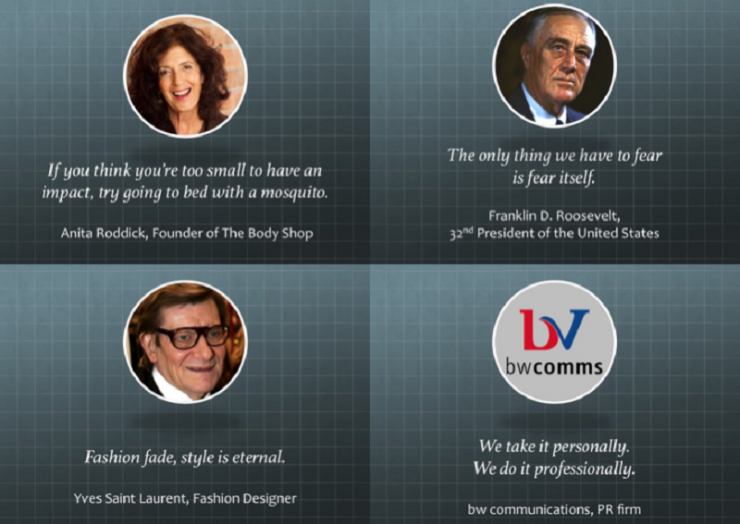WHAT is a Sound Bite? It is a striking brief remark or statement that communicates your core idea by conveying a profound message in smooth language. Without realizing it, sound bites are all around you. You need only to listen closely during conversations with friends or colleagues. It is a “lift speech”, a sum up or the essence of your message. An extract of your speech that helps you convey your key messages in a short, concise, and convincing way.
The American news organization introduced the term sound bite in late 1970s or early 1980s. Typically, a sound bite is short, catchy, one to two sentences when spoken or between 5 and 10 seconds when used by television and radio in their reports to summarize your opinion or make a point. One good example of a sound bite:
Be courageous. It’s one of the only places left uncrowded. – Anita Roddick
Why Need a Sound Bite?
As we are all bombarded with so much information, we need to cut through the clutter, allowing us to sell a message in a shortest possible time. The purpose is to grab the audience’s interest in what we have to say, so that they will watch or hear the whole story or interview or speech. For example, during media interviews that you do, reporters would need sound bites to take away.
Who Needs a Sound Bite?
Spokespersons in particular, need to have a sound bite ready in hand when they are at an event or in a media interview. Sound bite is used as one of the communication tools by corporate executives, politicians, leaders, influencers, key opinion formers, well known speakers and others. They need to include sound bites in their speeches for the purpose of spreading ideas to their audiences.
How to Develop a Good Sound Bite?
Make your sound bite simple that comprises of one or two sentences at the most. Ensure your key messages are in your sound bite. So take a step back and ask yourself what are you trying to say, what do you want to tell the public? Whether you want to focus on the concept or the idea or the theme of the event; sum up what you say in a short, conversational way.
According to Bill Penn, an author, in Market Yourself Through the Media, your sound bites should be short, sharp and relevant. They can be funny, hard-hitting or emotional, even frightening.
Characteristics of a Sound Bite
To help you prepare a good memorable sound bite, ask yourself does your sound bite have any of the following characteristics?
• Clear, brief, concise, simple, to the point,
• Vivid and dynamic language
• Easy to read, easy to be heard, easy to repeat
• Powerful and memorable
In sound bites you can include: opinion, emotion, and news value. It has to have a personality that is music to a reporter’s ear.
Steps in Developing a Sound Bite
• Plan and decide on what you want to achieve and write down what you want to say
• Use a simple structure, active voice nouns and verbs, avoid using any jargons, get to the point with minimum words
• Be creative and colorful, use articulate and concrete words
• Give it a punch, make it memorable, by being emotional; make the audiences surprised, cheer, laugh, shake their head
• Be direct and clear, include a call to action
To have a good quality of a sound bite, preparation is key. With a sound bite, it is a good chance for you to get your message across to a million people. And it is crucial that you have in hand a snappy and catchy sound bite to help put your message above others. So, when reporters are waving their microphones under your nose and they want to hear what you have to say, you’ll be more than ready to tell them your message. [by Ida Bayuni, Public Relations practitioner, bw communications – based in Jakarta]
















